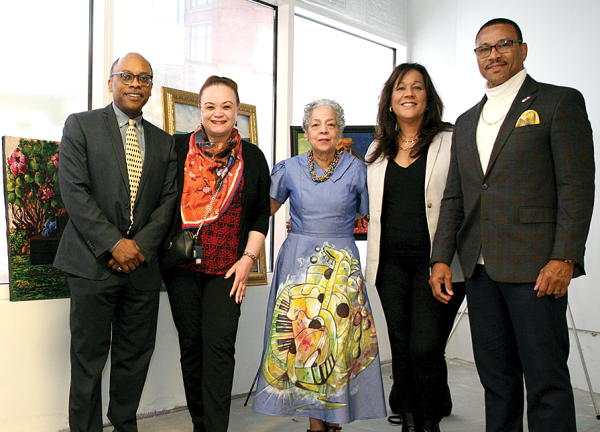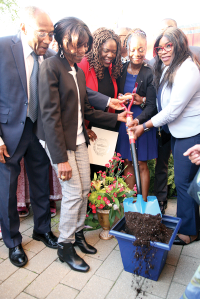May 30, 2024

Members of the Haitian Artists Assembly of Massachusetts, including Charlot Lucien, Evangeline Lucien, Mimi Desir, Joanne Buteau-Dumont, and Joseph Chery, inside the future TLCC. Seth Daniel photos

At a time when Haitians and their American cousins find it hard to celebrate amid ongoing turmoil back home, a groundbreaking ceremony for Boston’s Toussaint Louverture Cultural Center near North Station brought a welcome wind of pride and accomplishment that speakers said was felt throughout the diaspora.
Hundreds gathered under the warm evening sun on Mon., May 20, for a ceremony to mark the anticipated opening of a 2,000-square-foot space on Lovejoy Wharf, steps from the TD Garden and the Freedom Trail. It will be the first such center in New England and, perhaps, the nation, an accomplishment 25 years or so in the making, and one that was celebrated, from local founders Wilner and Marie Auguste to Haitians who have heard the news all the way in Port-au-Prince – not to forgot non-Haitian supporters like Boston Mayor Michelle Wu and cultural organizations representing other Caribbean cultures.
“This center is not going to be just great for Boston or for Haitians in Boston but a center that stands for all Haitians in the diaspora,” said Elvire Beauchard, consulate general of Haiti in Boston. “Many have tried to stop Toussaint Louverture in the past…but what he stands for is what humanity stands for. We must be proud of being Haitian.
“We know what our country is going through now, but I feel something is in the air and something is about to happen very big. But we will all have to work together to make it happen,” she continued, to applause.
Tears of joy, and sadness, were shed after the official toast to kick off the effort to raise money to build out the space.
“This is a beautiful moment because this is a dream Wilner and Marie Auguste had even when I was a kid being dragged out to meetings with my dad for Haitian Americans United (HAU),” said Boston City Council President Ruthzee Louijeune. “The Haitian story is a Boston story, and we should be able to tell it in every neighborhood like other cultures do. This city deserves to really see us – not just in Hyde Park and Mattapan where we are – but in every neighborhood.”
That sentiment was echoed by Dr. Aisha Miller, a Mattapan resident who was there representing the building owner, Related Beal, which made the space available through an arrangement with the city of Boston.
“You are here in the North End,” she said. “People didn’t think it was possible, but you are here and you’re breaking down barriers. This is a milestone and very significant for Boston…Your culture is going to be present here.”
The space was secured through a competitive process within the Boston Planning and Development Agency (BPDA) and will act as both a cultural center and a tourist information office. The TLCC Executive Committee championed the effort as part of HAU and has received the backing of the Haitian Artist Assembly of Massachusetts – which will provide and curate work from the rich Haitian art and creative heritage, to include painting, sculpture, poetry, literature, and metalwork.
Remarks were coordinated by Joseph Chery, of the Artists Assembly, and several speakers led the crowd in thought.
Charlot Lucien, a long-time artist and cultural ambassador for Boston Haitians, pointed out there are four small towns in America named ‘Haiti,’ a cemetery in Tennessee bearing Toussaint Louverture’s name, and schools named after Haitian heroes in Oklahoma and St. Louis. Numerous other attributes of the Haitian culture also are present in the United States and France as well, but he said they aren’t widely acknowledged.
“There have been negative things that have been attached to Haiti for many years and the history of Haiti has been erased from the history of the US and the history of France,” he said.
His hope is that the Boston center will reverse that erasure, and that it will also shine light on the injustices done to Haiti after it won its independence.
“We hope that they can clean up what has happened to us,” he said, noting that that could include some form of reparations.
The event concluded with a ceremonial groundbreaking led by Wilner and Marie Auguste, and other members of HAU. The next step for is to raise money to complete a full buildout of the space, which has already been designed.


